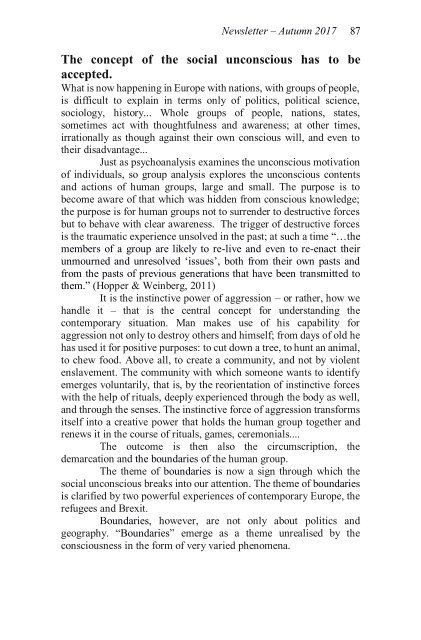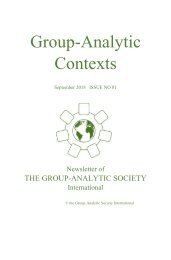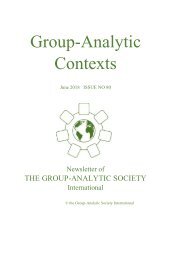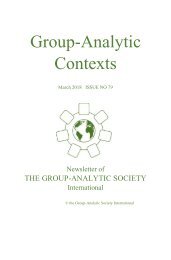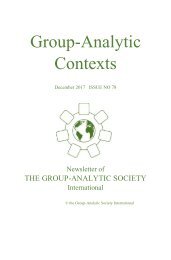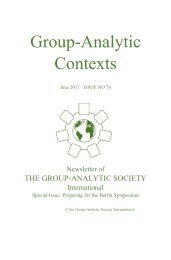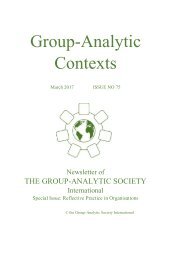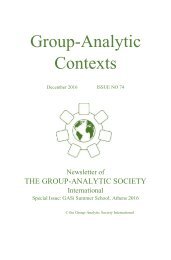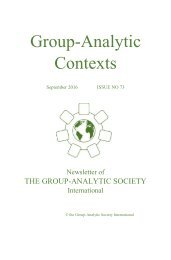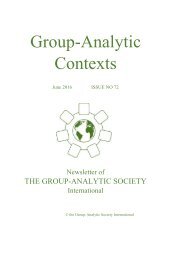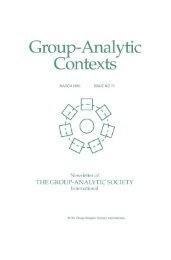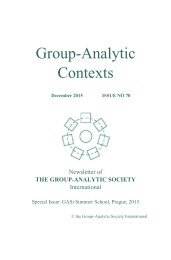Group Analytic Contexts, Issue 77, September 2017
Newsletter of the Group Analytic Society International
Newsletter of the Group Analytic Society International
You also want an ePaper? Increase the reach of your titles
YUMPU automatically turns print PDFs into web optimized ePapers that Google loves.
Newsletter – Autumn <strong>2017</strong> 87<br />
The concept of the social unconscious has to be<br />
accepted.<br />
What is now happening in Europe with nations, with groups of people,<br />
is difficult to explain in terms only of politics, political science,<br />
sociology, history... Whole groups of people, nations, states,<br />
sometimes act with thoughtfulness and awareness; at other times,<br />
irrationally as though against their own conscious will, and even to<br />
their disadvantage...<br />
Just as psychoanalysis examines the unconscious motivation<br />
of individuals, so group analysis explores the unconscious contents<br />
and actions of human groups, large and small. The purpose is to<br />
become aware of that which was hidden from conscious knowledge;<br />
the purpose is for human groups not to surrender to destructive forces<br />
but to behave with clear awareness. The trigger of destructive forces<br />
is the traumatic experience unsolved in the past; at such a time “…the<br />
members of a group are likely to re-live and even to re-enact their<br />
unmourned and unresolved ‘issues’, both from their own pasts and<br />
from the pasts of previous generations that have been transmitted to<br />
them.” (Hopper & Weinberg, 2011)<br />
It is the instinctive power of aggression – or rather, how we<br />
handle it – that is the central concept for understanding the<br />
contemporary situation. Man makes use of his capability for<br />
aggression not only to destroy others and himself; from days of old he<br />
has used it for positive purposes: to cut down a tree, to hunt an animal,<br />
to chew food. Above all, to create a community, and not by violent<br />
enslavement. The community with which someone wants to identify<br />
emerges voluntarily, that is, by the reorientation of instinctive forces<br />
with the help of rituals, deeply experienced through the body as well,<br />
and through the senses. The instinctive force of aggression transforms<br />
itself into a creative power that holds the human group together and<br />
renews it in the course of rituals, games, ceremonials....<br />
The outcome is then also the circumscription, the<br />
demarcation and the boundaries of the human group.<br />
The theme of boundaries is now a sign through which the<br />
social unconscious breaks into our attention. The theme of boundaries<br />
is clarified by two powerful experiences of contemporary Europe, the<br />
refugees and Brexit.<br />
Boundaries, however, are not only about politics and<br />
geography. “Boundaries” emerge as a theme unrealised by the<br />
consciousness in the form of very varied phenomena.


